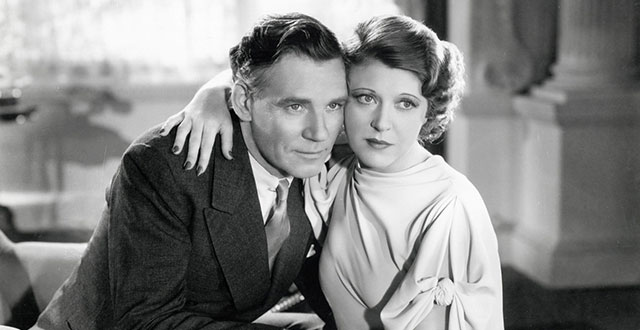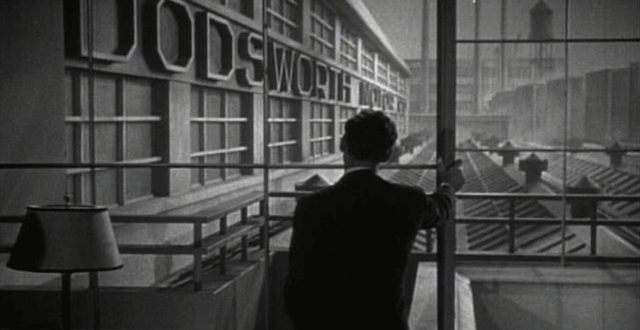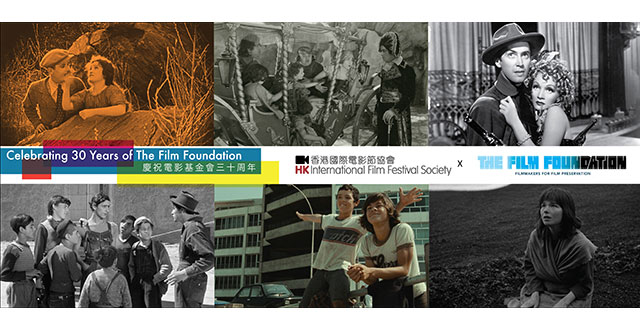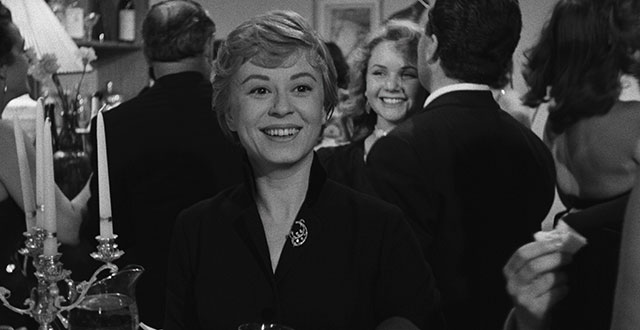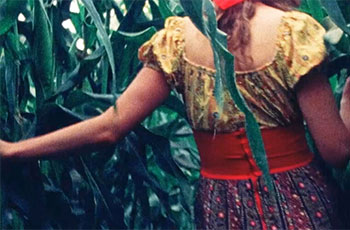News
DODSWORTH Blu-ray Release
David Krauss
An incisive examination of a disintegrating marriage and a top-flight production from beginning to end, Dodsworth stands as one of the best films of the 1930s. Director William Wyler's literate, absorbing adaptation of Sinclair Lewis's acclaimed novel paints a host of vivid character portraits while telling a timeless tale that addresses relatable themes. Walter Huston, Ruth Chatterton, and Mary Astor all contribute memorable performances, and a stunning restoration by the Academy of Motion Picture Arts and Sciences and The Film Foundation distinguishes Warner Archive's Blu-ray presentation, which comes very highly recommended.
Storyline: Our Reviewer's Take
4.5 Stars out of 5
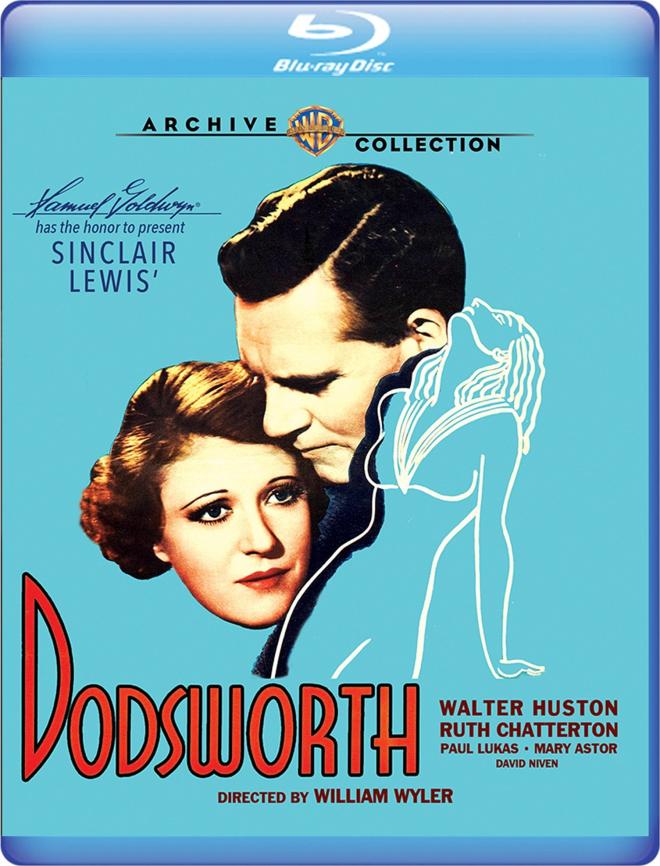
Though they battled and bickered and butted heads for a decade, producer Samuel Goldwyn and director William Wyler forged one of the most fruitful creative partnerships in Hollywood history. This dynamic duo collaborated on seven prestigious films between 1936 and 1946, beginning with These Three (a code-friendly version of Lillian Hellman's controversial play The Children's Hour) and culminating with the Oscar-winning World War II homecoming classic The Best Years of Our Lives. In between, they mounted such unforgettable dramas as Dead End, Wuthering Heights, The Little Foxes, and a potent adaptation of Sinclair Lewis's acclaimed novel Dodsworth.
Far from flashy, yet packed with relatable themes and insightful observations about marriage, society, and aging, Dodsworth often flies under the radar in discussions of top Golden Age films. Maybe the story's focus on middle-aged characters awash in personal turmoil limits its appeal, but once you dive into this absorbing drama, you'll see why it stands out among its cinematic peers. More substantive and nuanced than most 1930s films, Dodsworth also boasts impeccable direction and performances, a literate script, and elegant production values, all of which help make it one of era's most enduring motion pictures.
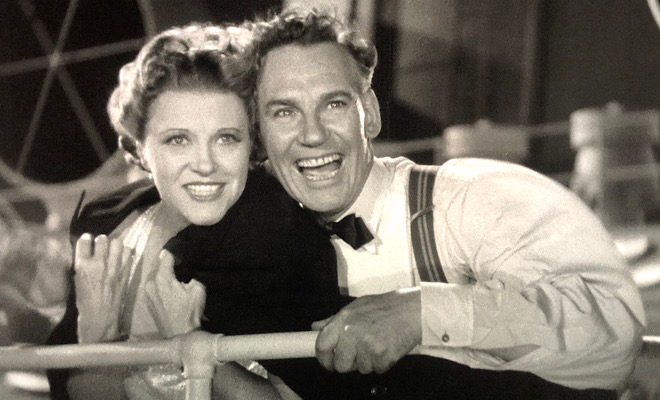
As the movie opens, Sam Dodsworth (Walter Huston) wistfully bids farewell to a successful career as an automobile magnate. A lucrative merger sends him into retirement, and to kick off his new life of leisure, he and his wife of 25 years, Fran (Ruth Chatterton), embark on a lengthy European tour. The couple hails from Ohio, so hobnobbing among the snooty, cosmopolitan elite on their transatlantic cruise makes them feel a bit like fish out of water. Fran, though, quickly adapts and embraces the high-toned, frivolous lifestyle, flitting from party to party and flirting with an array of wealthy lotharios. Sam indulges her, but prefers the quieter pursuits of typical tourists. Soon, friction creeps into the Dodsworth marriage, and after a month in Paris, that friction becomes a rift.
The harder Sam tries to reel Fran back in, the more stridently she strays. Though she seems committed to her marriage in the long run, Fran wants one last fling while she's still young enough to enjoy it. "You're rushing at old age, Sam, and I'm not ready for that yet!" she snaps. Her fear of getting older and losing her looks makes her especially vulnerable to the attentions of dashing suitors who may or may not have honorable intentions. As he and Fran drift further apart, an increasingly lonely and melancholic Sam reconnects with Edith Cortright (Mary Astor), a free-spirited American expatriate living in Italy, and discovers just how different two women can be.
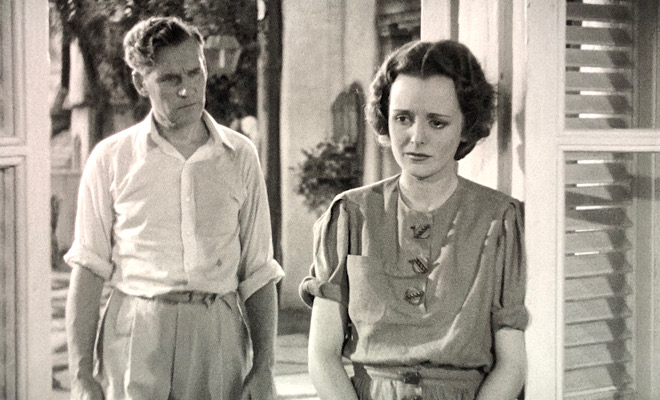
Most 1930s romances chronicle gooey young love or illicit affairs, but Dodsworth begins long after those movies end, making it instantly unique. Much like last year's Marriage Story, it paints a brutal portrait of a couple in crisis, and how their diverging interests, differing goals, and evolving personalities reveal problems in their relationship that most likely existed all along. Sam and Fran's 25-year union may seem road-tested and able to weather any potential storm, but due to his obsession with work and her domestic duties, they've never really spent much time together. Once they embark on their European odyssey, their respective personal journeys begin as well, and it's not long before both Sam and Fran begin to realize how little they have in common.
Drama transpired behind the scenes as well. Chatterton, who was nearing the end of a brief yet successful film career and ironically grappling with the same fear of waning youth as Fran, fought bitterly with Wyler over the interpretation of her role. She wanted to play Fran as an unadulterated bitch, while he demanded a more dimensional portrayal. Wyler prevailed, of course, and Chatterton's performance is much the better as a result. Though she deserved an Oscar nomination, sadly, she was snubbed.
Astor faced even more difficulties. Embroiled in a bitter child custody battle with her ex-husband, who threatened to expose her secret diary that supposedly contained explicit details of an extramarital affair with playwright George S. Kaufman, the actress toiled on the Dodsworth set during the day, then went directly to specially scheduled court proceedings in the early evening. The scandal was front-page news all over the nation for weeks, yet Astor never cracked under the pressure. Her relaxed, disarmingly natural performance is a tribute to her mettle and professionalism, and the part of Edith Cortright just might have saved her career. In her autobiography, My Story, Astor writes, "The character I played was a charming and gracious woman; the public could not match her with the luridly immoral woman the tabloids had painted."
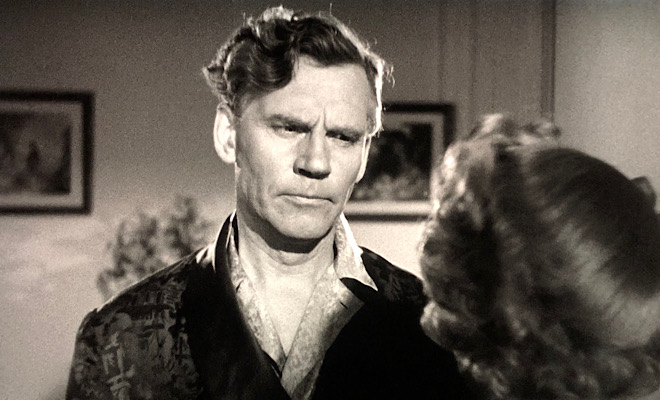
Huston had played Sam Dodsworth on Broadway to great acclaim a couple of years earlier, and his film portrayal earned similar plaudits. The New York Film Critics Circle named him the year's Best Actor, and he nabbed an Oscar nod as well. Gruff yet tender, rigid yet indulgent, and always bound by a warped sense of duty, his Dodsworth is a fascinating, flawed, utterly human figure, and Huston - one of America's finest actors - brings him brilliantly to life.
Huston, Chatterton, and Astor, though, form only the tip of the cast iceberg. Paul Lukas, a young David Niven, Spring Byington, and Miracle on 34th Street's John Payne (billed here as John Howard Payne) in his film debut also contribute strong work. And then there's the always mesmerizing Maria Ouspenskaya, who received a Best Supporting Actress Oscar nomination in her first American film for her all-too-brief appearance as a dour and intimidating Austrian baroness who makes mincemeat of Fran. (In all, Dodsworth garnered seven Academy Award nominations, including Best Picture, Director, and Screenplay, and took home the prize for Best Art Direction.)
Dodsworth was a rarity in its day - a perceptive, sophisticated, and refreshingly adult film that didn't cow tow to Hollywood conventions. It may be a period piece today, but its themes remain relatable and its tone still feels contemporary 84 years after its initial release. Some things change, but marriage doesn't, and this timeless take on the imperfect institution continues to strike a chord, a nerve, and the fancy of discriminating movie fans.
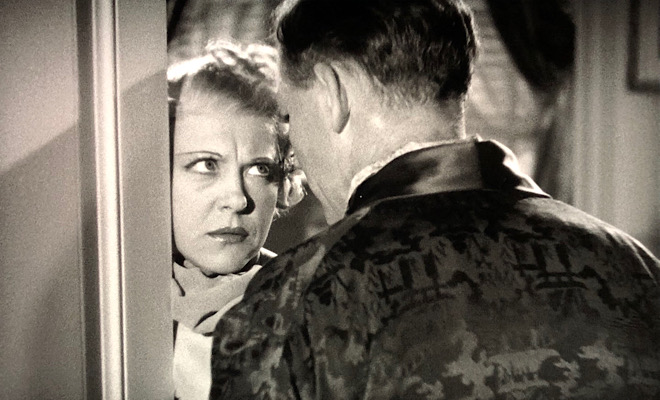
Vital Disc Stats: The Blu-ray
Dodsworth arrives on Blu-ray packaged in a standard case. Video codec is 1080p/AVC-MPEG-4 and audio is DTS-HD Master Audio 2.0 mono. Once the disc is inserted into the player, the static menu without music immediately pops up; no previews or promos precede it.
Video Review
5 Stars out of 5
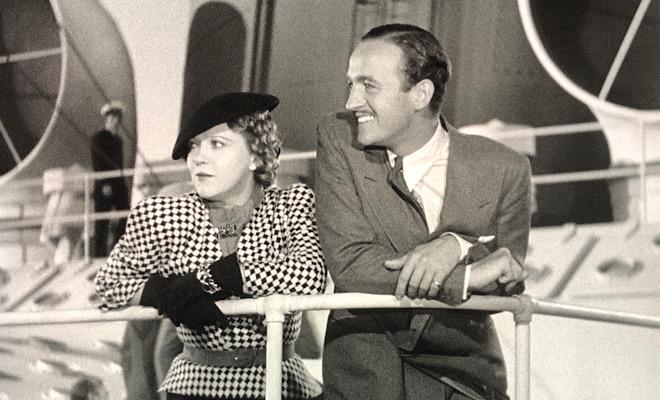
Dodsworth was lovingly restored last year by the Academy of Motion Picture Arts and Sciences Film Archive and The Film Foundation, in association with the Samuel Goldwyn Jr. Family Trust. Restoration funding was provided by the George Lucas Family Foundation. From the opening frames to the closing credits, exceptional clarity, pitch-perfect contrast, and a beautifully varied grayscale distinguish this glorious 1080p/AVC MPEG-4 transfer, which makes this 84-year-old film look almost brand new. Grain is seamlessly resolved, producing a wonderfully film-like, vibrant image punctuated by rich blacks, bright whites, and terrific shadow delineation. All the details of the ornate sets (the film received a well-deserved Oscar for its art direction) are crisp, costume textures are distinct, and sharp close-ups highlight fine facial features well. Best of all, the source material is free of any nicks, marks, or scratches. Dodsworth has never looked better, and few films of the period have made a more stunning transition to Blu-ray than this underrated classic.
Audio Review
4 Stars out of 5
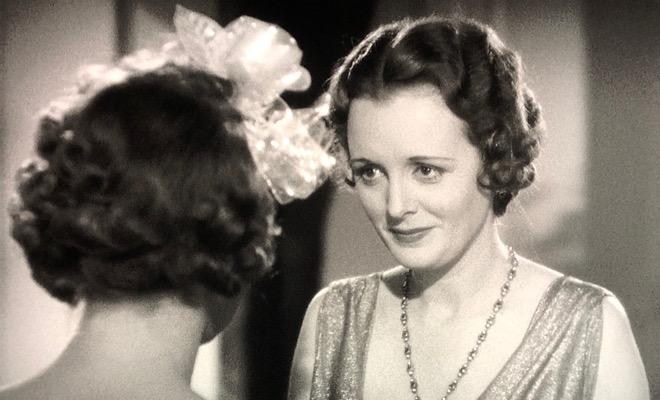
The DTS-HD Master Audio 2.0 mono track also has been restored, and the results are quite good. Any age-related hiss, pops, and crackle have been meticulously erased, leaving a clean track that outputs well-modulated, full-bodied sound. A wide dynamic scale handles all the highs and lows of Alfred Newman's omnipresent score without a hint of distortion, but occasionally the music slightly obscures the dialogue, especially when Ruth Chatterton speaks. Her high-pitched voice often gets lost among the strings, rendering some of her lines indecipherable. A couple of palpable bass bursts lend the audio some welcome heft, and subtle atmospherics come through nicely, too. Despite the minor dialogue annoyance, this vintage track greatly exceeds expectations and enhances the enjoyment of this absorbing drama.
Special Features
1 Stars out of 5
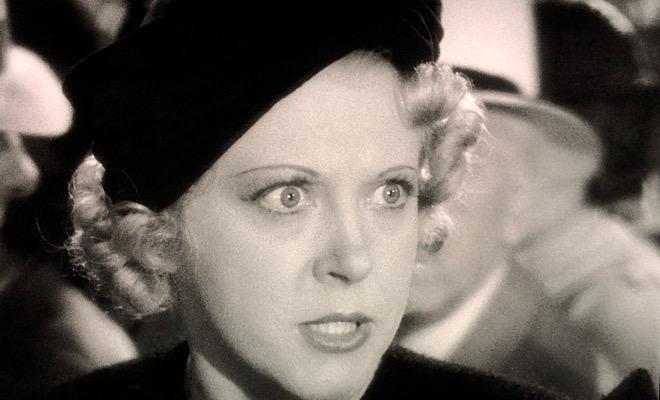
The only supplement is a 60-minute radio adaptation of Dodsworth that aired as part of the popular Lux Radio Theater series on April 12, 1937. Walter Huston reprises his title role, with his wife Nan Sunderland taking over for Ruth Chatterton and Barbara O'Neil, best known for her portrayal of Scarlett O'Hara's mother in Gone with the Wind, assuming Mary Astor's role. Though the truncated plot shortens and omits various sequences, the story translates well to the audio medium, and all the performances are stellar. The broadcast is hosted by director Cecil B. DeMille and includes all the vintage commercials for Lux beauty products, as well as some scripted banter with the stars following the story's conclusion.
Final Thoughts
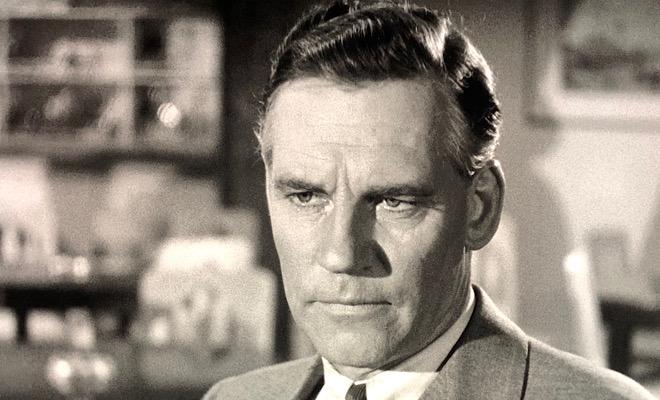
Dodsworth may not enjoy the same degree of renown as some Golden Age classics, but it remains one of the most adult, literate, and substantive films of the 1930s. Despite its age, director William Wyler's brilliant adaptation of Sinclair Lewis's novel tells an eminently relatable story that makes cogent observations about marriage, aging, and class. Terrific performances from Walter Huston, Ruth Chatterton, and Mary Astor distinguish this absorbing drama, while a truly stunning restoration brings this timeless tale and Best Picture nominee to life like never before. Dodsworth is a great film, and Warner Archive's Blu-ray release comes very highly recommended.
Message from TFF
In light of the current health & safety recommendations surrounding COVID 19, most of our festival, archive, and repertory theatre partners have suspended their screening programs. The Film Foundation will share updates as they become available, and wishes everyone well during these challenging times.
HKIFF to celebrate The Film Foundation’s 30th anniversary with six rare cinematic gems
The Hong Kong International Film Festival Society will celebrate the 30th anniversary of The Film Foundation by showcasing new restorations of six rarely-seen film classics in this year’s festival.
Established in 1990 by Martin SCORSESE and other leading filmmakers, The Film Foundation is dedicated to protecting and preserving motion picture history. By working in partnership with archives and studios, the foundation has helped to restore over 850 films – including 40 films from 24 different countries through its renowned World Cinema Project – which are made accessible to the public through festivals, museums, and educational institutions around the world. The foundation's free educational curriculum, The Story of Movies, teaches young people - over 10 million to date - about film language and history.
“It is an honor to partner with The Film Foundation on the occasion of its 30th anniversary in bringing some of its most important works to the Hong Kong audiences,” enthused HKIFF Director of Programming Geoffrey WONG.
“The six hidden gems in this special tribute, ranging from silent classics, Hollywood Western comedy, to Mexican and Brazilian neo-social realism, have all been restored to their full glory with The Film Foundation’s support. They also highlight the foundation’s mission in championing film heritage and rich diversity in world cinema.”
“I’m thrilled that such an exciting selection of restorations supported by The Film Foundation are screening at this year’s Hong Kong International Film Festival. These six titles represent the diverse range of films the foundation has helped restore over the past three decades. Spanning every era, genre, and region, the hundreds of films restored show the rich history of cinema and the universality of the art of film. From Pixote and Los Olvidados to Rosita and The Broken Butterfly, all are rare works created by master filmmakers. This year in particular, during our 30th anniversary, we’re thrilled to partner with the Hong Kong International Film Festival and thank them for their devotion to film culture and commitment to the foundation’s work,” said Martin SCORSESE, the founder and chair of The Film Foundation.
The most-anticipated work in the programme is The Broken Butterfly (1919), pioneering French director Maurice TOURNEUR’s silent American classic, which the public has not seen for a century. This poignant romance amply demonstrates why TOURNEUR’s mastery of stylized lighting, set design and atmosphere had left such a lasting influence on the Hollywood screen.
Invited to work in Hollywood by the legendary Mary PICKFORD, German maestro Ernst LUBITSCH created a signature cinematic style – known as the Lubitsch Touch, and his first American production, Rosita (1923), is often hailed as one of the most beautifully made silent films. Priming his iconic western with slapstick, wisecracks, and action in Destry Rides Again (1939), Hollywood veteran George MARSHALL subverted the genre in an amusing gender role reversal, anchored by flawless performances by James STEWART and Marlene DIETRICH.
Regarded as a masterpiece of Latin American cinema, Los Olvidados (1950) earned Spanish master Luis BUÑUEL a Best Director kudo at Cannes for his raw and ruthless vision of juvenile crime in a Mexico City slum, steadfast in its realism, yet operatic in its tragedy with flourishes of surreal, transcendental insight in a stunning dream sequence. The film inspired Hector BABENCO whose Pixote (1980) similarly shows the unbearably harsh lives of abandoned children in Sao Paulo in realistic yet shockingly lyrical images that express the texture of everyday brutality.
American director Nietzchka KEENE drew her inspiration from a Brothers Grimm fairy tale and transformed it into The Juniper Tree (1990), an ethereal psychological horror film shot against the backdrop of Iceland’s stunning landscape and starring Björk in her enchanting film debut.
WONG said the collaboration between HKIFFS and The Film Foundation would continue beyond this year’s festival. “In addition to this special anniversary tribute, classics from The Film Foundation will regularly feature in our upcoming Cine Fan programmes,” he said.
The Hong Kong International Film Festival, now in its 44th edition, will be held from 24 March to 6 April. The public can purchase tickets online (www.hkiff.org.hk) and through all URBTIX and HK Ticketing outlets starting from 13 March 2020.
Six classics from The Film Foundation:
1. The Broken Butterfly (1919)
Restored in 2019 by The Film Foundation at L’Immagine Ritrovata laboratory in association with La Fondation Jérôme Seydoux-Pathé. Restoration funding provided by Louis XIII Cognac.
2. Rosita (1923)
Restored by The Museum of Modern Art. Restoration funding provided by the Louis B. Mayer Foundation, RT Features, The Film Foundation and the Celeste Bartos Preservation Fund.
3. Destry Rides Again (1939)
Restored by Universal Pictures in collaboration with The Film Foundation. Special thanks to Martin Scorsese and Steven Spielberg for their consultation on this restoration.
4. Los Olvidados (1950)
Restored by The Film Foundation’s World Cinema Project at L’Immagine Ritrovata in collaboration with Fundación Televisa, Televisa, Cineteca Nacional Mexico, and Filmoteca de la UNAM. Restoration funding provided by The Material World Foundation.
5. Pixote (1980)
Restored by The Film Foundation’s World Cinema Project and Cineteca di Bologna at L'Immagine Ritrovata in association with HB Filmes, Cinemateca Brasileira, and JLS Facilitações Sonoras. Restoration funded by the George Lucas Family Foundation.
6. The Juniper Tree (1990)
Restored by the Wisconsin Center for Film and Theater Research and The Film Foundation, with funding provided by the George Lucas Family Foundation.
Berlinale Classics – Six Classic Films Celebrate World Premieres in Digitally Restored Versions
The Berlinale Classics section, curated by Rainer Rother, will salute “100 years of Fellini” with Il bidone (The Swindle), and will show two of the earliest narrative films about the Holocaust, Ostatni etap (The Last Stage) and Daleká cesta (Distant Journey), 75 years after the end of World War II. In cooperation with the section’s strong partners, the series will also include festival winner Bushido zankoku monogatari (Cruel Tale of Bushido) by Japanese master Tadashi Imai, the all-star smash hit A Fish Called Wanda, featuring Monty Python veterans, and the silent film classic Das Wachsfigurenkabinett (Waxworks), newly restored by the Stiftung Deutsche Kinemathek.
The Berlinale Classics 2020:
Il bidone (The Swindle)
Italy / France 1955
by Federico Fellini
with Broderick Crawford, Giulietta Masina, Richard Basehart, Franco Fabrizi, Sue Ellen Blake, Irene Cefaro
World premiere of the digitally restored version (DCP 4K)
Il bidone might be the closest Fellini came to creating a genuine genre film, but what begins as a caper movie turns into a tragic, existential drama. Set in post-war Italy and tracing the glaring contrast between rich and poor, Il bidone is considered Federico Fellini’s last neo-realistic film with a touch of Kafka. The world premiere screening of the digitally restored version is in honour of the director, who would have celebrated his 100th birthday on January 20, 2020, and of the 30th anniversary of Martin Scorsese’s Film Foundation.
The 35mm camera and sound negatives, as well as the original fine-grain were used to restore the full-length version of Il bidone that was presented by Fellini at the Venice Film Festival in 1955. The restoration was undertaken by the Cineteca di Bologna and The Film Foundation in collaboration with Titanus, with funding provided by the George Lucas Family Foundation. Restoration works were carried out at L'Immagine Ritrovata in 2019.
Bushido zankoku monogatari (Cruel Tale of Bushido)
Japan 1963
by Tadashi Imai
with Kinnosuke Nakamura (in 7 roles), Satomi Oka, Kyoko Kishida, Misako Watanabe, Yoshiko Mita
World premiere of the digitally restored version (DCP 2K)
Historical episodes from generations of a samurai family graphically reveal the barbarity of the feudal system in medieval Japan, exposing parallels to the modern achievement-oriented society. Imai’s film won the Golden Bear in 1963. The digital restoration was funded by the Toei Company, Ltd. on the occasion of the 70th anniversary of the Berlinale, and carried out by the Toei Lab Company; Toei will also be celebrating its 70th anniversary next year. The primary element used for the restoration was the original 35mm negative.
Daleká cesta (Distant Journey)
Czechoslovakia 1949
by Alfréd Radok
with Blanka Waleská, Otomar Krejča, Viktor Očásek, Zdeňka Baldová, Eduard Kohout
World premiere of the digitally restored version 2019 (DCP 4K)
The film traces the path of Czech Jews to Germany’s extermination camps, using the fictional narrative of a family from Prague. The narrative scenes are combined with clips from Nazi propaganda films, newsreels and Leni Riefenstahl’s Triumph des Willes (Triumph of the Will) from 1935. Director Alfréd Radok, who was himself interned in a work camp and lost close relatives to the concentration camps, created an artistically effectual portrayal of the horrors of the Holocaust. The digital restoration was supervised by Národní filmový archiv, Prague and carried out at Universal Productions Partners (UPP). Both sound and image were digitised from the duplicate positive preserved by Národní filmový archiv, Prague. Missing parts of the image were retrieved from a nitrate print from the collection of La Cinémathèque de Toulouse, which was preserved at CNC.
A Fish Called Wanda
United Kingdom / USA 1988
by Charles Crichton
with John Cleese, Jamie Lee Curtis, Kevin Kline, Michael Palin, Maria Aitken
World premiere of the digitally restored version 2017–2019 (DCP 2K)
A fast and furious romance in Britain’s best comedy tradition. A London barrister is seduced by an American jewel thief who hopes she can use him to find out where his client hid the loot from their heist. At the 2020 Berlin Film Festival, Park Circus will be presenting the world premiere of a new 2K restoration of the MGM Studios’ production A Fish Called Wanda. The restoration was carried out by Arrow Films; the original 35mm camera negative was scanned in 4K resolution on a pin-registered Northlight Scanner at Pinewood Studios.
Ostatni etap (The Last Stage)
Poland 1948
by Wanda Jakubowska
with Wanda Bartówna, Huguette Faget, Tatjana Górecka, Antonina Górecka, Maria Winogradowa, Barbara Drapińska, Aleksandra Śląska
World premiere of the digitally restored version 2019 (DCP 4K)
Ostatni etap was one of the earliest films to tackle the subject of the Holocaust and was shot partially on location at Auschwitz-Birkenau. The director realistically depicts the everyday horrors of forced labour and mass extermination, but also resistance by the women prisoners. The restoration by Poland’s National Film Archive – Audiovisual Institute, Warsaw, in cooperation with Tor Film Production, was based on a duplicate negative, since the original camera negative was lost. The restoration was funded by the European Regional Development Fund and the Polish Ministry of Culture and National Heritage.
Das Wachsfigurenkabinett (Waxworks)
Germany 1924
by Paul Leni
with Emil Jannings, Conrad Veidt, Werner Krauss, Wilhelm Dieterle, Olga Belajeff
World premiere of the digitally restored version 2015–2019 (DCP 2K) — with audio description
Harun al-Rashid, Ivan the Terrible, and Jack the Ripper feature in this fantastical three-part omnibus film directed by Paul Leni. It was a magic moment in silent filmmaking, between an art adventure and fun fair. The screening is a cooperative venture of the Berlin International Film Festival and the Deutsche Kinemathek, working with ZDF and ARTE. The film will be shown on February 21 at 5.30 pm with live musical accompaniment by the Ensemble Musikfabrik from North Rhine-Westphalia, conducted by Elena Schwarz. The new music, composed in 2019 by Bernd Schultheis, Olav Lervik, and Jan Kohl, was commissioned by ZDF/ARTE. The digital restoration was funded by the German Commissioner for Culture and the Media (BKM). (See Press release November 19, 2020)
Advance ticket sales for Das Wachsfigurenkabinett (Waxworks) start on February 17, 2020, at 10 am at berlinale.de.
